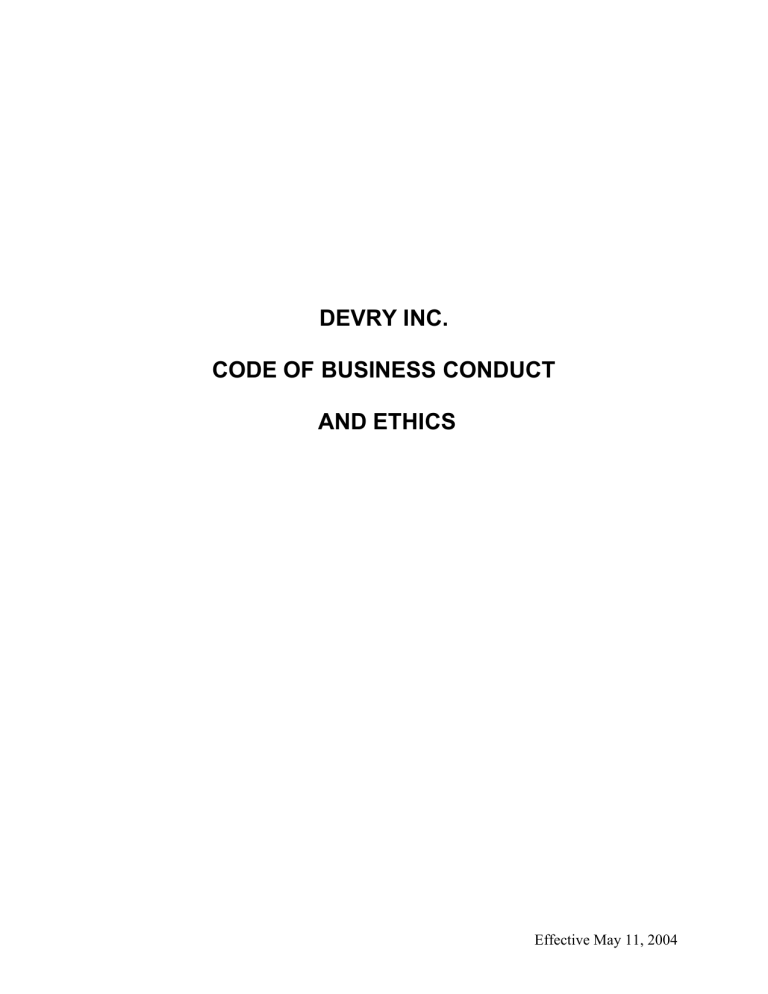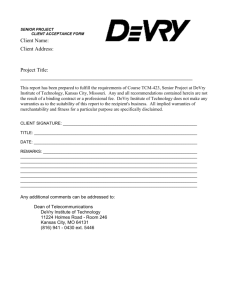Code of Conduct

DEVRY INC.
CODE OF BUSINESS CONDUCT
AND ETHICS
Effective May 11, 2004
Effective May 11, 2004
Code of Business Conduct and Ethics
A message from the
Co-Chief Executive Officers
For more than 70 years, DeVry has held a leading position in education by offering students excellent value – education that is the best of its kind at an affordable cost. Our success derives in large part from having cultivated two intangible yet invaluable assets – our good name and the wisdom, energy and skill of our faculty and staff. We are proud of the reputation and trust we have earned and are determined to protect and enhance it. Our Code of Business Conduct and
Ethics (“Code”) contains policies, which must be followed by everyone who does business on behalf of DeVry.
We are committed to promoting integrity and maintaining the highest standard of ethical conduct in all of our activities. Our business success is dependent on trusting relationships, which are built on this foundation of integrity. While this Code covers a wide range of business practices, it is difficult to make a policy that applies to every situation, and there will be times when the
Code does not address a particular question. Applying common sense, good judgment and integrity to every business issue will help to ensure that your decisions are consistent with
DeVry’s values and this Code . Remember, if in doubt, it is better to seek advice before a course of action is begun or a new commitment is made so that our standards and applicable legal requirements can be reviewed and difficulties avoided.
The principles and standards contained in this Code are applicable to all directors, officers, employees, agents, consultants and representatives of DeVry. You are responsible for reading and following these policies. If you are an employee and have questions, please contact your supervisor, the Human Resources Department or the General Counsel’s Office.
DeVry’s success depends upon each of us. Acting with integrity and the highest standards is not only good policy, it is also good business. Every DeVry employee and shareholder relies upon you to do the right thing.
Sincerely,
Ronald
Effective May 11, 2004
DeVry Inc.
Code of Business Conduct and Ethics
INTRODUCTION
Our goal at DeVry Inc. and its subsidiaries (“DeVry” or the “Company”) is to provide high quality post-secondary education and excellent service to our students. In pursuit of our goal, we strive to achieve the highest business and personal standards of conduct, as well as compliance with the laws and regulations that apply to our business. Adherence to the standards contained in this Code of Business Conduct and Ethics (the “Code”) will help to ensure decisions that reflect care for all of our stakeholders. The policies in this Code apply across DeVry, in all subsidiaries, businesses, countries and states.
This Code is intended as an overview of the Company’s guiding principles and not as a restatement of Company policies and procedures. This Code cannot and is not intended to cover every applicable law or provide answers to all questions that might arise; for that we must ultimately rely on each person’s good sense of what is right, including a sense of when it is proper to seek guidance from others on the appropriate course of conduct. If a law conflicts with a policy in this Code, you must comply with the law.
Employees should refer to the policies contained in the Employee Handbook for a description of the policies and required reporting procedures applicable to them. This Code is a statement of goals and expectations for individual and business conduct. It is not intended to, and does not in any way, constitute an employment contract or assurance of continued employment, and does not create any rights in any employee, student, director, supplier, competitor, shareholder or any other person or entity.
If employees have questions regarding any of the goals or standards discussed or policies referenced in this Code or are in doubt about the best course of action in a particular situation, the employee should refer to the reporting requirements for that goal or standard as stated in the
Code, or the reporting requirements for policies as stated in the Employee Handbook, and contact the person or party designated. If no resource is listed or when in doubt, ask the
Corporate General Counsel (630-574-1901).
It is the obligation of each and every director, officer and employee of DeVry to become familiar with the goals and policies of the Company and to integrate them into every aspect of our business. Our corporate ethics are ultimately determined by all of us as we do our daily jobs.
Our standard has been, and will continue to be, that of the highest ethical business conduct.
Any waiver of compliance with any policy in this Code must be approved by the Audit
Committee of DeVry’s Board of Directors.
CONFLICTS OF INTEREST
Directors, officers and employees of DeVry have a duty of loyalty to the Company and must therefore avoid any actual or apparent conflict of interest with the Company. No director or employee may abuse a corporate position for personal advantage or promote any action contrary to DeVry’s stated standards for business conduct.
1
Effective May 11, 2004
A conflict situation can arise when an employee, officer or director takes actions or has interests that negatively impact, or are perceived to negatively impact, that person’s ability to act in the best interests of DeVry. Conflicts of interest also arise when an employee, officer or director, or a member of his or her immediate family ( i.e
., spouse, parents, children, siblings and in-laws), receives improper personal benefits as a result of his or her position in the Company.
CORPORATE OPPORTUNITIES
No director, officer or employee may: (a) take for himself or herself personally opportunities that are discovered through the use of Company property, information or position; (b) use Company property, information or position for personal gain; or (c) compete with the Company.
Employees, officers and directors owe a duty to the Company to advance its legitimate interests when the opportunity to do so arises.
USE OF INSIDE INFORMATION
DeVry has a long-standing commitment to comply with all securities laws and regulations. In this regard, it is the Company’s goal to protect shareholder investments through strict enforcement of the prohibition against insider trading set forth in federal securities laws and regulations. No director, officer or employee may buy or sell DeVry stock at a time when in possession of “material non-public information.” (There is, however, an exception for trades made pursuant to certain pre-existing trading plans established in compliance with applicable law and filed with the General Counsel’s Office.) Passing such information to someone who may buy or sell DeVry’s securities is also prohibited. The prohibition on insider trading applies to
DeVry’s securities and to securities of other companies if the director, officer or employee learns of material non-public information about those other companies in the course of his or her duties for DeVry. This prohibition also extends to certain non-employees who may learn “material non-public information” about the Company, including spouses, relatives, and close friends of directors, officers or employees. When you are prohibited from buying or selling securities because you possess material non-public information, you may not have any other person purchase or sell such securities on your behalf. You should not provide advice to your family, friends or others about buying or selling DeVry stock.
“Material information” is any information that a reasonable investor would consider important in deciding whether to buy, sell or hold securities. Examples include information about Company acquisitions and divestitures, Company enrollment or earnings figures and trends and important information on litigation. Consult the General Counsel’s Office if you are questioning whether certain information is material.
It is important to keep in mind that if any trade you make becomes the subject to a government investigation, the trade will be viewed after-the-fact with the benefit of hindsight. Consequently, employees should always carefully consider how their trades would look from this perspective.
Two simple rules can help protect you in this area: (i) don’t use material non-public information for personal gain; and (ii) don’t pass along such information to someone else who has no need to know.
2
Effective May 11, 2004
Insider trading is both unethical and illegal and will be dealt with firmly. To review the policy and for specific employee reporting procedures, employees should refer to the Company’s
Insider Trading Policy.
It is also improper and inappropriate for DeVry directors, officers and employees to engage in short-term or speculative transactions involving Company securities. Accordingly, DeVry directors, officers and employees are prohibited from short sales of, or buying puts and calls with respect to, DeVry securities.
COMPETITION AND FAIR DEALING
We seek to outperform our competitors fairly and honestly. We seek competitive advantage through superior performance, not through unethical or illegal business practices. This commitment also prohibits any unfair or untrue disparagement of a DeVry competitor. Each director, officer and employee must endeavor to deal fairly and in good faith with, and respect the rights of, DeVry students, employees, suppliers, competitors and others.
Federal and state laws prohibit unfair methods of competition and unfair or deceptive acts and practices. These laws are designed to protect competitors and consumers. While it is impossible to list all types of prohibited conduct, some examples include:
• commercial bribery or payoffs to induce business or breaches of contracts by others;
• price fixing, bid rigging, colluding to allocate customers or markets, boycotting suppliers or customers;
•
• acquiring a competitor’s trade secrets through bribery or theft; making false, deceptive, or disparaging claims or comparisons regarding competitors or their products;
•
mislabeling and
• making affirmative claims concerning one’s own products without a reasonable basis for doing so.
In particular, all public statements by or on behalf of DeVry, including in connection with advertising, promotional materials, sales representations, warranties and guarantees, should always be truthful and have a reasonable basis in fact and should not be misleading or purposefully made easily susceptible of misinterpretation.
CONFIDENTIALITY
One of our most valuable assets is our body of business information, ideas and data. The widespread use of computers has made this information accessible to many employees. Failure to adequately protect this information may place DeVry at a competitive disadvantage in the marketplace or breach our contractual obligations. Accordingly, all directors, officers and employees should maintain the confidentiality of information entrusted to them by the Company and students or others related to DeVry’s business. Such information must not be disclosed to others, except when disclosure is authorized by DeVry or legally mandated. The obligation to
3
Effective May 11, 2004 preserve confidential information continues even after employment ends. Confidential information includes all non-public information that might be of use to competitors or harmful to
DeVry or its students if disclosed. To review the policy, employees should refer to the
Company’s policy regarding Confidentiality in the Employee Handbook.
PROTECTION AND USE OF COMPANY ASSETS
Company assets, such as information, materials, supplies, time, intellectual property, software, hardware, and facilities, among other property, are valuable resources owned, licensed, copyrighted or otherwise belonging to the Company. Safeguarding Company assets is the responsibility of all directors, officers and employees. Theft, carelessness and waste can have a direct impact on DeVry’s profitability. All Company assets should be used for legitimate business purposes. Use of Company equipment and property, such as the telephone, computer and e-mail systems, may be monitored and/or searched by DeVry, and by engaging in such use you consent to such monitoring and searching. To review the policy, employees should refer to the Company’s policies regarding Company assets contained in the Employee Handbook.
FULL, FAIR, ACCURATE, TIMELY AND UNDERSTANDABLE DISCLOSURE
It is the policy of DeVry to provide full, fair, accurate, timely and understandable disclosures in all reports and documents that DeVry files with or submits to the SEC, as well as in all other public communications made by DeVry. It is also DeVry’s policy to provide full, fair, accurate, timely and understandable disclosure about the financial condition of the Company in compliance with applicable accounting principles, laws, rules and regulations. All books and records of DeVry shall be kept in such a way as to fully and fairly reflect all Company transactions. You are expected to comply fully with the Company’s internal controls and disclosure controls and procedures and to provide full, fair, accurate, timely and understandable responses to all requests for information in accordance therewith.
It is the Company’s policy to address all material concerns regarding its financial statements and its accounting, internal accounting controls or audit matters. If you have complaints or concerns regarding questionable accounting or auditing matters involving the Company, you may submit these concerns or complaints confidentially and, if you wish, anonymously in accordance with the procedures set forth below under "Duty to Report and Consequences.” In addition, if you wish, you may submit your concerns or complaints directly to the chairperson of the Company’s
Audit Committee.
ACCURACY AND RETENTION OF BUSINESS RECORDS
DeVry requires honest and accurate recording and reporting of information in order to make responsible business decisions and accurate public disclosures. We expect employees to record and report information accurately and honestly. This includes accurate reporting of time worked, business expenses incurred and all other business-related activities. Use good judgment and common sense when preparing any Company document to ensure that it objectively and accurately reflects the facts of the situation. Business records and communications often become public, and derogatory remarks, guesswork or inappropriate characterizations of people and
4
Effective May 11, 2004 companies that can be misunderstood should be avoided. This applies equally to e-mail, internal memos and formal reports.
Financial records must accurately reflect transactions and conform to generally accepted accounting principles. No entry may be made on the Company’s books and records which intentionally hides or disguises the true nature of any transaction. No undisclosed or unrecorded funds or assets may be established.
As a matter of good housekeeping, you should retain Company documents for the period of time specified in the applicable Company record-retention schedule and then dispose of them. A copy of the applicable record-retention policy can be obtained from DeVry’s General Counsel’s
Office.
COMPLIANCE WITH LAWS, RULES AND REGULATIONS
Obeying the law, both in letter and spirit, is the foundation on which DeVry’s ethical standards are built. All employees must respect and obey the laws of each governmental unit in which we operate. Although not all employees are expected to know the details of the laws, it is important to know enough to determine when to seek advice from supervisors, managers or other appropriate personnel. In addition, DeVry requires that its officers and employees comply with the workplace policies and applicable laws and regulations described in the Employee
Handbook.
GIFTS
Neither directors, officers nor employees of DeVry nor their immediate family members may accept gifts or favors that create any obligation – either stated or implied – to a competitor, supplier, student or customer. Gifts should not be accepted from such companies or their agents unless the gift either has been previously approved in writing by a supervisor or is of only nominal value (e.g., tee shirts, caps, etc.).
Directors, officers and employees may not offer any gift or favor to any employee, or a member of the immediate family of an employee, of a competitor, supplier, student or customer if the gift or favor might place the recipient under any obligation to the person making the gift or to DeVry.
Kickbacks, bribes, rebates or other illegal consideration are never acceptable, and must never be either given or accepted by anyone acting on behalf of DeVry. Directors, officers and employees dealing with government agencies should be particularly alert to any agency rules limiting or prohibiting gifts or other favors.
If a customer, supplier or government agency has adopted a more stringent policy than DeVry’s regarding gifts and gratuities, DeVry directors, officers, employees, agents and representatives must comply with that more stringent policy.
POLITICAL CONTRIBUTIONS AND PUBLIC SERVICE INVOLVEMENT
DeVry works hard to earn and maintain the respect of the communities in which it operates.
Directors, officers and employees are encouraged to speak out on important community issues;
5
Effective May 11, 2004 however, they must be careful not to give the impression they are speaking on behalf of DeVry unless they are actually authorized to do so.
DeVry is not permitted to contribute, directly or indirectly, to any federal political campaign or party. Directors, officers and employees may not use Company expense accounts to pay for any personal political contributions or seek any other form of Company reimbursement. In addition, directors, officers and employees should not use Company facilities or Company assets for the benefit of any party or candidate, including an employee individually running for office.
Political payments in foreign countries pose special legal problems. Employees engaged in foreign operations should never make a payment to any foreign government official, agency or instrumentality, or to any foreign political party, party official or candidate unless the specific payment has been reviewed and approved by the General Counsel’s Office.
EMPLOYEE DISCRIMINATION AND HARASSMENT
DeVry is firmly committed to the principle of equality of opportunity in employment and human relationships. It is the Company’s policy to ensure equal treatment for all employees and applicants, regardless of race, color, religion, national origin, age, gender, sexual orientation or disability. This policy applies to all Company activities, including, but not limited to, recruiting, hiring, training, transfers, promotions and benefits.
Business relationships with competitors, suppliers, students, and customers of DeVry must always be conducted free of discrimination based on race, religion, gender, national origin, veteran status or disability.
Each employee is expected to treat fellow employees and students with respect and dignity. It is
Company policy to provide a workplace free from tensions involving matters that do not relate to the Company's business. In particular, an atmosphere of tension created by ethnic, racial, sexual or religious remarks, unwelcome sexual advances, or requests for sexual favors, will not be tolerated.
Harassment of employees, applicants, students, customers, contractors or suppliers by employees is a violation of Company policy. Harassment includes, without limitation, verbal harassment
(epithets, derogatory statements, slurs), physical harassment (hitting, pushing or other aggressive physical contact) and visual harassment (posters, cartoons, drawings) which continues after being told to stop. Harassment may be unlawful and is prohibited whether it occurs in the workplace, at student residences, at customer or vendor sites, or at other employment related events or activities. However, the objectionable conduct need not be unlawful to violate
Company policy. Company policy prohibits all inappropriate harassing conduct, whether or not the conduct is so severe as to be considered a violation of law.
Sexual harassment is defined as unwelcome sexual advances, requests for sexual favors, and verbal or physical conduct of a sexual nature, (1) when submission to or rejection of such conduct is made either explicitly or implicitly a term or condition of employment or student services; (2) or is used as a basis for employment decisions or academic assessment; or (3) when such conduct has the purpose or effect of unreasonably interfering with an individual's work or
6
Effective May 11, 2004 school performance by creating an intimidating, hostile, humiliating or sexually offensive environment.
RESPONSIBLE MANAGEMENT OF GOVERNMENT FUNDS
Federal law and regulations prohibit DeVry from participating in any federal student financial aid program under Title IV of the Higher Education Act of 1965, as amended, if DeVry has any employee who has been convicted of, or pled nolo contendere or guilty to, any crime involving the acquisition, use or expenditure of federal, state or local government funds, or who has been administratively or judicially determined to have committed fraud or any material violation involving federal, state or local government funds. To ensure that DeVry does not violate these regulations, each employee working in Student Finance and each officer must certify in writing as a condition of employment that no such convictions, pleas or determinations have been made with respect to him or her. If any current or future DeVry employee is affected by any such conviction, plea or determination, their employment or prospect for employment with DeVry will immediately cease.
CONFIDENTIALITY OF STUDENT RECORDS
The Family Educational Rights and Privacy Act of 1974, as amended (“FERPA”) contains requirements designed to afford parents and students privacy and other rights with respect to student educational records. In addition, FERPA includes limitations on what student records institutions can disclose and to whom institutions can disclose student records without the student’s prior consent. FERPA applies to the education records of all current and former DeVry students. DeVry will fully comply with all the FERPA requirements, and each employee at each of DeVry’s location is responsible for knowing, understanding and following the FERPA requirements.
SALES AGENTS, CONSULTANTS OR OTHER PROFESSIONAL SERVICES
Sales agents, consultants and representatives are required to observe the same standards of conduct as DeVry’s directors, officers and employees when conducting business with or for
DeVry. No director, officer or employee may indirectly, through agents, do anything the director, officer or employee is prohibited from doing under DeVry’s policy. No payment on behalf of the Company will be approved or made with the intent that any part of the payment is to be used for any purpose other than that described by the documents supporting the payment.
Business integrity is a key standard for the selection and retention of those who represent DeVry.
It is extremely important that we engage in thorough due diligence before retaining any sales agent or consultant.
DUTY TO REPORT AND CONSEQUENCES
All DeVry directors, officers, employees, agents, consultants and representatives must understand and comply with DeVry’s Code. Violation of the Code may result in discipline for
7
Effective May 11, 2004 directors, officers and employees, up to and including termination of employment, and other appropriate consequences for non-employees.
Each director, officer, employee, agent, consultant and representative is responsible for adhering to DeVry policy in all matters related to DeVry’s business. If you know or have good grounds for suspecting that any illegal business conduct, or any other conduct that violates the Code, has occurred or is planned by any employee or non-employee agent or representative, you must report it in a timely manner to the General Counsel’s Office at DeVry, or by calling the confidential employee hotline at (800-335-7635). Doing so is not an act of disloyalty, but an action that shows your sense of responsibility and fairness to your fellow employees, as well as to our customers, suppliers and shareholders. Your report may be anonymous. Reports of Code violations will be promptly investigated. Reasonable measures will be undertaken to preserve the confidentiality of information that is reported during the investigation and to protect persons who report information from retaliation. Following the investigation, appropriate corrective measures will be taken. Individuals who falsely report in order to harass or punish another person will also be subject to appropriate disciplinary measures.
To achieve compliance with this Code, it is the managers’ and supervisors’ assignment to ensure that all employees are made fully aware of the importance of compliance and understand the procedure for reporting violations.
Employees can report suspected violations of Company policies contained in the Employee
Handbook by following the reporting procedures for that specific policy in the Employee
Handbook. A confidential employee hotline has been established with an independent company to provide employees with a confidential and anonymous way to report suspected violations of the Code or the policies set forth in the Employee Handbook. (Call 1-800-335-7639).
Individuals who falsely report in order to harass or punish another person will also be subject to appropriate disciplinary measures.
The Company forbids retaliation against employees who report violations of this Code of
Business Conduct and Ethics in good faith.
SEEKING ADVICE
DeVry is committed to operating its business in accordance with the highest level of integrity and ethical standards and all applicable laws, regulations and rules. The Company wants to make sure that everyone who does business on behalf of DeVry fully understands what this Code requires and is able to ask questions if advice is needed. Should an improper practice or irregularity occur within the Company, we are committed to correcting the problem and taking appropriate steps to make sure it cannot happen again.
If you are unsure of what a policy requires of you, are concerned that DeVry may be in violation of law or feel that a company policy is being violated, you may seek advice from your supervisor, senior management, DeVry’s Human Resources Department or DeVry’s General
Counsel’s Office.
8
Effective May 11, 2004
DEVRY INC.
CODE OF BUSINESS CONDUCT AND ETHICS
CERTIFICATION OF RECEIPT
Within thirty (30) days of receipt of this Code, you are required to sign and fill out this certification and send it to the DeVry Inc. General Counsel’s Office at DeVry Inc., One Tower
Lane, Suite 1000, Oakbrook Terrace, Illinois 60181. If you have any questions, please contact your assigned supervisor or, in their absence, the General Counsel’s Office at DeVry’s headquarters in Oakbrook Terrace, Illinois at 1-630-574-1901.
This certifies that I, ___________________________________, have received a copy of
DeVry’s Code of Business Conduct and Ethics. I have read and understand the document.
__________________________ ________________________
__________________________
Printed Name
__________________________ _________________________
Department Location
9





